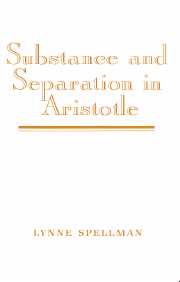IV - Substance and Aristotle's Epistemology
Published online by Cambridge University Press: 04 December 2009
Summary
On the interpretation of Aristotle's account of substance I have just offered, substances are specimens of natural kinds that are numerically the same as sensible objects without being identical with them. Further, in virtue of their indistinguishability from one another (within the same kind), specimens of kinds have the knowability characteristic of the Forms without the separation; indeed it would not mischaracterize Aristotle's theory to say that it treats each specimen of the kind human being as if it were The Human Being – each specimen of a kind, in other words, as if it were the Platonic Form.
But even if specimens of natural kinds meet the requirement set forth in Metaphysics VII 1 that substances must be first in knowledge and definition, mere knowability on the part of substances does nothing to establish that they can be known by us. After all, one of the most serious difficulties with the Theory of Forms is that even though Forms are said to be eternal, unchanging, and the objects of definition, knowledge of them remains problematic. I contend that Aristotle believes his rejection of the separation of Forms can address this issue also – that is to say, he believes that his view enables him to explain how it is that there is knowledge.
- Type
- Chapter
- Information
- Substance and Separation in Aristotle , pp. 63 - 82Publisher: Cambridge University PressPrint publication year: 1995



